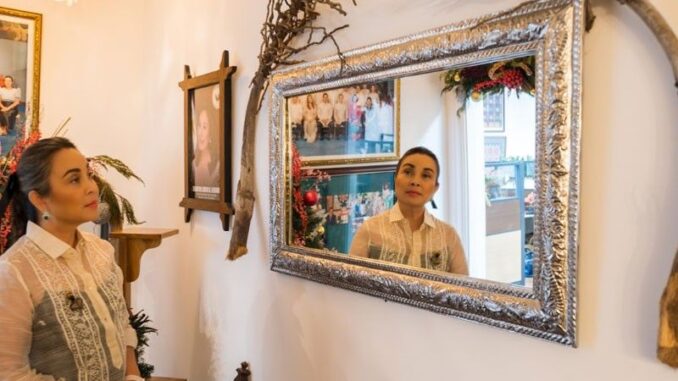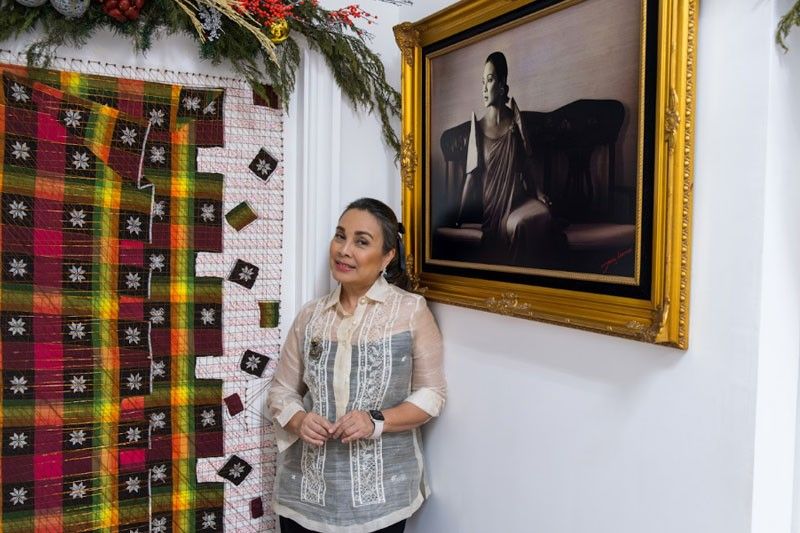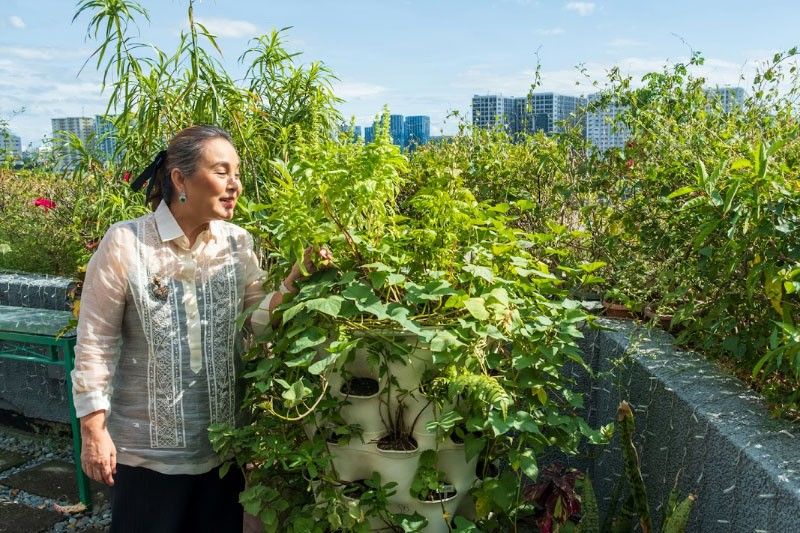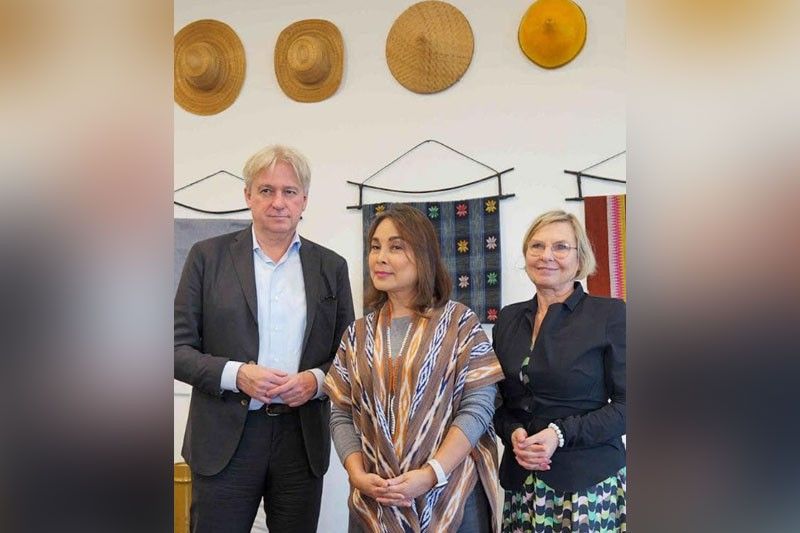
She is a senator, cultural advocate, and a global champion — but for now she is our gracious host, sharing with us her lunch at her office in the Senate as well as stories about championing culture and the environment, encountering an important Rizal site in the Czech Republic, and marveling at the Ullmer house in Wilhelmsfeld where our National Hero lived in Germany for a spell. As we enter her office, she points to two pieces of gnarled, textured driftwood that are artfully placed to frame an ornate mirror along the entranceway.
“Pinulot ‘yan ng caretaker sa farm — bako-bakong wood. Naisip ko puwede pa ‘yan magamit. You don’t have to spend a large sum, anything can be recycled — zero waste,” she explains, adding that she wants a world where everything has its own use. “If it’s useless, it should be made useful. It also applies to us as human beings. It means that everything has a purpose and everybody has a role to play.”
Nurturing culture: Surrounded by Philippine weaves and native hats, Senator Legarda connects her advocacy for cultural diplomacy with the rich traditions of Filipino craftsmanship.
Senator Legarda sees her role as championing causes that are often overlooked in government — such as art, environmental protection, and the welfare of indigenous communities and the preservation of their culture.
Team Philippines recently concluded its participation in the 60th International Art Biennale last November in Venice, Italy as well as the 76th Frankfurter Buchmesse (FBM) last October in Germany. These undertakings were not merely initiated by Senator Legarda; they are the realization of her visionary leadership. The senator enlisted the National Commission for Culture and the Arts (NCCA) to oversee the Philippine Pavilion at the 56th International Art Biennale in 2015 after a 51-year absence, as well as tapped both the NCCA and the National Book Development Board (NBDB) for the Philippines’ role as Guest of Honour (GoH) at next year’s book fair. These efforts have been remarkable successes, further cementing the Philippines’ place on the global stage in art, curatorship, and international publishing.

Weaving destiny: In her office, the senator highlights her dedication to cultural preservation, standing beside her portrait and some vibrant Philippine textiles that tie to her mission of keeping history alive.
The senator has always championed our artists, curators, cultural workers, writers, editors, and publishers, firmly believing they deserve to be on the same stage as their global counterparts.
“If I did not act on my vision, fund it, and create convergence teams (government agencies, the private sector, and the academe), would we have the Philippine Pavilion in the Venice Biennale? Would we be the Guest of Honor at the Frankfurt Book Fair? It goes beyond funding. It’s about organizing agencies, identifying the most effective organizations and individuals for each project, and making it happen. Hindi puwedeng ningas-cogon or sa simula lang. We need sustained participation.”

Nature’s way: On her senate office terrace, she tends to her “useful, edible” garden, a reflection of her commitment to renewal, care, and sustainable living.
To listen to the senator recount her journey is to take a guided tour through forgotten histories and unseen places. There’s Litom??ice in the Czech Republic, a small town in Ústí nad Labem region reminiscent of Intramuros, where Rizal memorabilia sits in a bastion-like room. “It’s lacking,” she notes. “All you see are photos of politicians who stopped by.”

During her recent meeting with Juergen Boos, president and CEO of Frankfurter Buchmesse, and Claudia Kaiser, VP for business development, the senator highlighted the decades-long effort to bring Filipino stories to the global stage.
The conversation shifts to National Artist Federico Alcuaz, whose little-known ties to Prague emerge. “He did art protis, a special Czech art form, in a studio in Brno, just outside of Prague,” she explains. “He also maintained a home in Wiesbaden, Germany.”
A thread of synchronicity weaves through her stories. At the 2024 Frankfurt Book Fair, where Italy was the Guest of Honour, the Philippines was formally handed the ceremonial scroll during the closing event last October. The country to assume the mantle after the Philippines? The Czech Republic.
She points out, “Connections. Conversations. Who would know this if we didn’t tell these stories?”
The road to Frankfurt didn’t unfurl overnight. Legarda recounts how it all began with a single question, posed in 2015: “How can we be the GoH country?” The senator got even more determined when Indonesia became the first Southeast Asian country to be given the distinction. She describes the arduous process with her signature candidness. “It was eight years in the making.” It involved closed-door meetings with Juergen Boos, CEO of the FBM, and rigorous demands — 100 translations, author lineups, exhibitions and, of course, an enormous budget.
At first, it was a vision met with skepticism. “He told me, ‘It’s a long process, 10 years in advance, with big budgets.’ I just said, ‘We’re willing to wait.’” It is the kind of audacity that defines Legarda’s approach to cultural diplomacy. “If I didn’t amend the budget, there would be no support. Zero. As in zero.”
Her unrelenting drive has made the impossible seem inevitable. For years, the Philippines’ absence at major events like the Venice Biennale was a glaring void in global contemporary art. Her solution was pragmatic and democratic: an open call, merit-based selection, and a consistent vision that extends beyond the short term. Now, the Philippines has become a fixture in both the Art and Architecture Biennales, attracting a large number of visitors and favorable press from foreign media outlets.
The house of the rising son
Wilhelmsfeld, Germany, a quiet village two hours away from Heidelberg, holds a special place in history. It was here that a young Rizal, then a medical student, found refuge with the Ullmer family. At the time, Rizal could not afford accommodation in Heidelberg, where he did further studies in ophthalmology. The senator’s encounter with the house took on urgency when she learned the congregation could no longer maintain it. “They said, in fact, we want to sell it because the congregation needs money.”
There were conversations with Fritz Ullmer, the grandson of Karl, the Protestant minister who was Rizal’s friend. Even the mayor of Wilhelmsfeld got involved. The pandemic brought an unexpected pause to the process, but it also inspired Senator Legarda to document our hero’s journey in Germany, touching on the house’s history in Finding Rizal in a Time of Barriers. That documentary cemented her belief that the house deserved preservation, because of its historical and cultural weight. The senator envisions it as a Sentro Rizal hub, a cultural landmark for the Filipino diaspora and an enduring tribute to the hero. “The idea is to have collateral activities there in October 2025.” Her words convey a sense of duty — a personal commitment to ensure that Rizal’s legacy in Wilhelmsfeld lives on.
It is this eye for detail, for the subtle nuances of history and culture, that sets her work apart. “If we don’t preserve it, who will know who we are? It’s about self-respect. It’s about humanity,” she insists.
Her personal anecdotes often border on the cinematic: a senator driving through walled cities in Europe to touring apartments where Rizal once stayed, or meetings with palace owners and book fair directors to secure venues and insist that the Philippines be given a rightful place at the table. These are not incidental stories — they are deliberate acts of cultural diplomacy.
At the heart of Senator Legarda’s work lies a philosophy of renewal: a belief that threads through her gardens, art collection, or advocacies. The senator takes us to the office terrace where she keeps a garden (a “useful, edible” one), plucking off oregano and sweet basil leaves for us to bring home. She talks about her farm in Tagaytay, which she describes as an Eden of sorts. A space that reflects her ethos. “It’s not magarbo,” she says. “But the trees speak to you. It’s magical.” For her, a garden — like art, like culture — can only thrive with care, patience and purpose.
In her view, this philosophy is as applicable to nations as it is to plants. “How can we negotiate for ourselves if we don’t even know our worth? How can we stand up for each other?”
For Legarda, cultural diplomacy is not about waiting for opportunities; it is about creating them. “Seize the moment? No. Create it,” she declares. Her work is proof of what can happen when vision meets persistence.
From the Venice Biennale to the Frankfurt Book Fair, from a forgotten town in the Czech Republic to a far-flung barangay in Angat, Bulacan where a community library — once installed in the Venetian Arsenale as the centerpiece of the Philippine Pavilion — had its homecoming, Senator Legarda’s work represents a quiet but undeniable cultural renaissance. It is about reclaiming space, telling stories, and ensuring that the world sees the Philippines — not just as a footnote, but as a voice worth listening to.
“Are we better today than we were yesterday?” she asks. “Have we shared knowledge, created jobs, enlightened people? If not, then what’s the point?” It is a question she continues to answer — one project, one pavilion, one story at a time.
And each story is a piece of driftwood that together forms one magical garden.


Be the first to comment